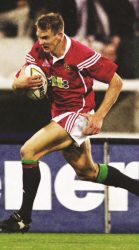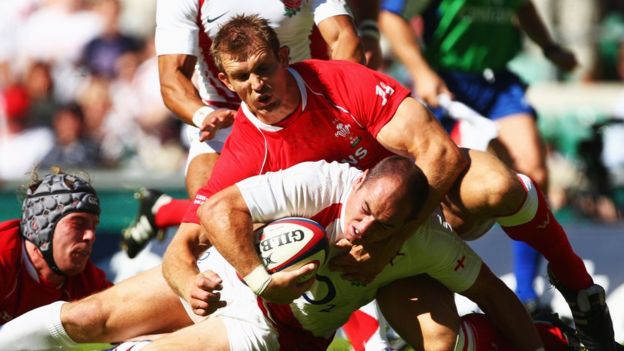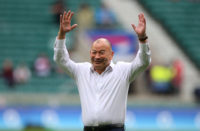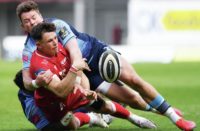[quote] “Glory Days.
Well they'll pass you by, Glory Days
In the wink of a young girl's eye,
Glory Days,
Glory Days.”
– Bruce Springsteen [/quote]
Dafydd James' Glory Days will forever remain more glorious than most to those who saw him fly like an eagle up among the stars.
They remember him on the wing at Wembley 20 years ago when England only had to turn up at the Empire Stadium to collect their Grand Slam until Wales, the supposedly hopeless outsiders, somehow brought the old place crashing down around them shortly before the bulldozers did the rest.
They remember him on the same wing at the Gabba in Brisbane two years later for the Lions, how he went streaking over in the corner after Brian O'Driscoll and Jason Robinson had torn the Aussies asunder in the first Test.
James has never been one to talk about his glory days, unlike the ‘big' baseball player in the Springsteen song whom ‘The Boss' bumped into years after they last met and “all he kept talking about was Glory Days”.
The paraphernalia from James' performances on the world stage are hidden either in a cupboard or stuffed into old kit-bags. He is not one for show, not, as he tells me, “one of these people who say ‘look at me' sort of thing”.
The solitary nod to a time when he reached the pinnacle of his sport as a British and Irish Lion is to be found in a newly-framed photograph of the try in Brisbane. It was given to him as ‘a present', which probably saved it from being put out of sight with the rest of the souvenirs.
Springsteen's song, about a sportsman struggling to come to terms with life after sport, will strike an awkward chord with James and a far from sweet one at that. It will reverberate with a clang and a clatter through the mind of a man whose deep depression has pushed him into the pits of despair. “It has been hell,'' he tells me.
Nobody knew until James, now 45, took the brave decision to make his predicament public in an interview with Ashleigh Crowther on BBC Wales television. “The best way to describe it is that you are in a hole, a dark hole,'' he told Crother. “And the hole is a little bit further than you can reach to get out.
“It's a big thing now this ‘it's ok not to be ok'. And I'm not Ok. I'm struggling. I'll be quite honest with you, I suffer badly. Anxiety, panic attacks and I still do. I fractured my neck, I lost my career and, unfortunately, I went through a divorce at the same time.''

Three days later, after expressing his gratitude for the flood of support on social media, he tells me he has now lost something else, his job as a representative for a medical devices company. Worse still, it may force him to sell his home.
“It never rains but it pours,'' he says. “Now I'm unemployed. It's a tough old time and I know that I'm far from being the only one. I've been blown away by the reaction I have had from the public and by the realisation of how many people out there are struggling.
“People go through all sorts of trials and tribulations in their lives and some have said that me talking about it has helped them. I know for a fact about one young man. His parents contacted me, explained that their son was suffering from depression and asked me to talk to him. He was ready to end his life.
“Being asked to talk to him was something I took as a huge compliment. I talked to him and it's great to know that he seems to be getting better. That was all before anyone knew of my problems.”
A professional from the first season of the ‘open' era, in 1995, James scored almost 150 tries from 364 matches for Bridgend, Pontypridd, Llanelli, Celtic Warriors, Harlequins, Scarlets, Cardiff Blues and Sale. Fifty one Tests for Wales and the Lions brought another 16 tries.
“I was institutionalised by the game,'' he says. “I lived and breathed the game. I did an apprenticeship in electrical engineering at Swansea University but I'd been in professional sport all my working life.
“Looking back, there was a lot of anger and frustration, having to finish playing when I wasn't ready. It can feel very lonely almost as if you've been isolated. You feel like you're losing your identity.
“I'd been on the slippery slope but I thought I had a career mapped out as a coach in strength and conditioning at the Scarlets. Stephen Jones was going to be backs' coach with Simon Easterby in charge of the forwards and Phil Davies above it all as head coach. It didn't happen and I got left out on a limb.''
Davies left in May 2008 as the Scarlets wrestled with the double whammy of losing too many matches on the field and too much money on it. James' admission that he has been living with depression for ‘ten years plus' takes him back to that time.
“I found myself staring up from the bottom of the pit,'' he says. “I'm thinking to myself: ‘Where do I go from here?' That was some years ago and I still struggle with which direction to take.''
If the clouds swirling around him were too black for even a sliver of a silver lining to be noticed, James can at least see one now. It's been put there by those offering hands to lift him out of his darkness into the light.
When it comes to pass it will feel as if the Glory Days are back, better than ever.


























